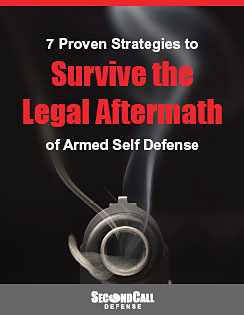Why Warning Shots Are Such a Bad Idea
by Rob Morse
You’ve heard the saying a thousand times. You will never need a gun until the moment when you need one immediately. Like a parachute or a fire extinguisher, a gun is a life saving tool and not a toy. We use a firearm to stop an immediate and lethal threat. That is why we don’t fire warning shots.
You probably heard this in your concealed carry class, but here are the key factors that need to be present to justify using lethal force:
- You (or another person being attacked) are innocent. You did not start this fight.
- You are in
immediate
danger. You don’t have time to do anything else but defend yourself. - The threat is
credible.
Your attacker has the means, intent, and the ability to kill you or cause great bodily injury or harm. - The threat is
unavoidable.
You can’t step back and lock the door. You can’t step on the gas and drive away. - Your response is
proportional
or “reasonable.”
Is a more moderate response sufficient to save your life?
That reasonable factor gets us into trouble, and I’m going to use a tough example. Suppose a bunch of drunk family members start pushing each other and throwing insults. Your drunken in-laws are threatening everyone. Can you call the cops and walk away, or do you need to kill someone right now to prevent even greater injury?
You fire a warning shot to show them you’re serious …
and then you get hauled off to jail. “But I didn’t want to kill my brother-in-law,” you say. That reaction makes great sense, but either you misunderstood the threat, or a gun was the wrong tool for the job.
You used a lethal tool when lethal force was not justified. Putting your hand on your gun, or even threatening to do so, isn’t justified either. By doing so, you’ve threatened to use lethal force. Was your life in danger, or was it really your wallet or your pride?
What you cannot do is use a gun to intimidate someone.
That is what criminals do.
That is why warning shots are such a bad idea. You fired a shot and did not mean to kill your attacker. A warning shot says that your life was not in immediate and unavoidable danger. The bullet hole you made is the period at the end of your confession. Don’t do it!
Suppose you’re at an event that has turned ugly. You may have to grab your family and run to your car. That is the best solution because there will be a lethal instrument in any fight where you are involved. You know there will be, because you brought it. That has serious implications.
If you knew your friends or relatives could get out of control, then the prosecutor will tell the jury that you brought your gun and walked into trouble even when you could have avoided the situation. After all, you are the one who brought the gun to the family fight on purpose. The prosecutor has a point. We don’t use a gun to intimidate, but only to stop a lethal and unavoidable attack.
Your gun is a physical tool, not a psychological one.
When should you shoot? Now is the time to think about it. Consider what you should do before the insults or fists are flying. Knowing when to shoot is as important as knowing how to shoot. Just like the physical skill of shooting your target, your judgment training also takes practice.
If you are going somewhere and you think you might need your gun, then don’t go …
and don’t use a warning shot!
Rob Morse works and writes in Southwest Louisiana. He writes at Ammoland, at his Slowfacts blog, and at Clash Daily. Rob co-hosts the Polite Society Podcast, and hosts the Self-Defense Gun Stories Podcast each week.

